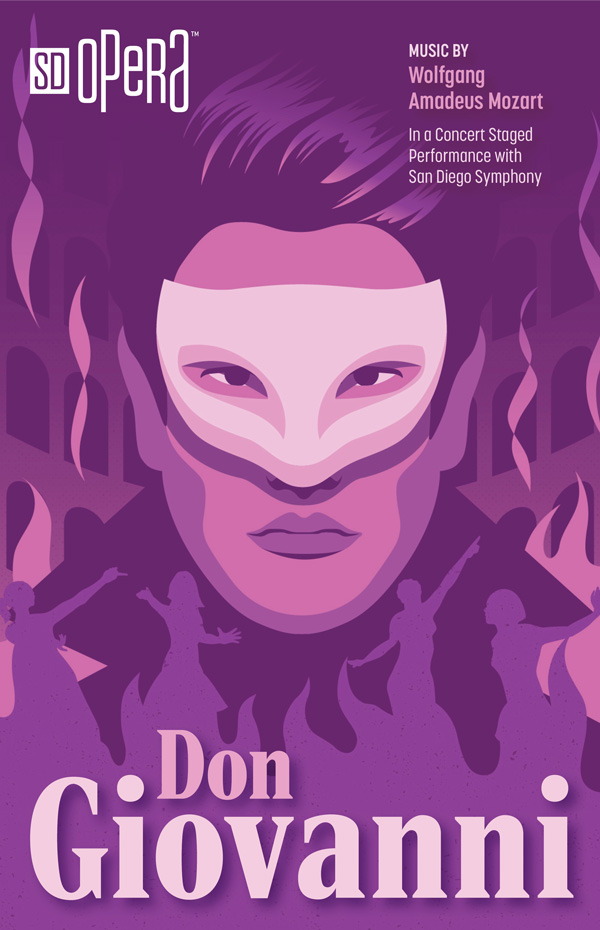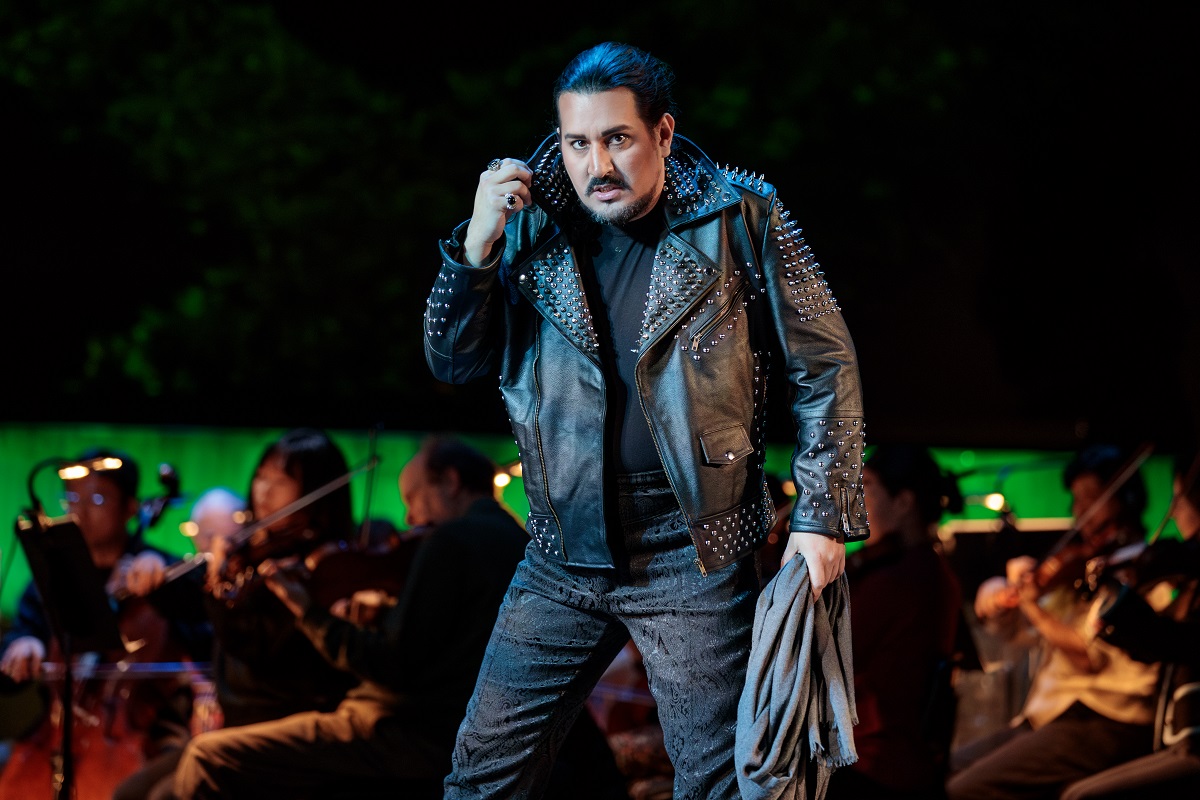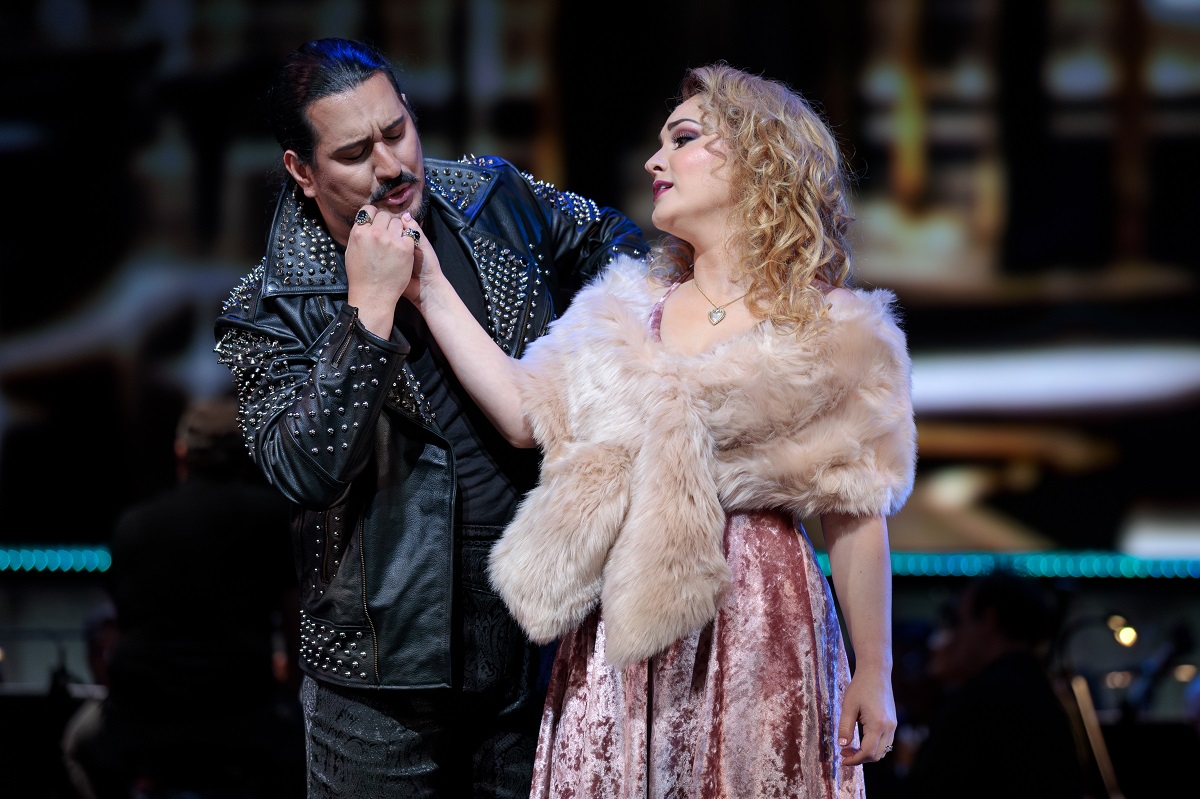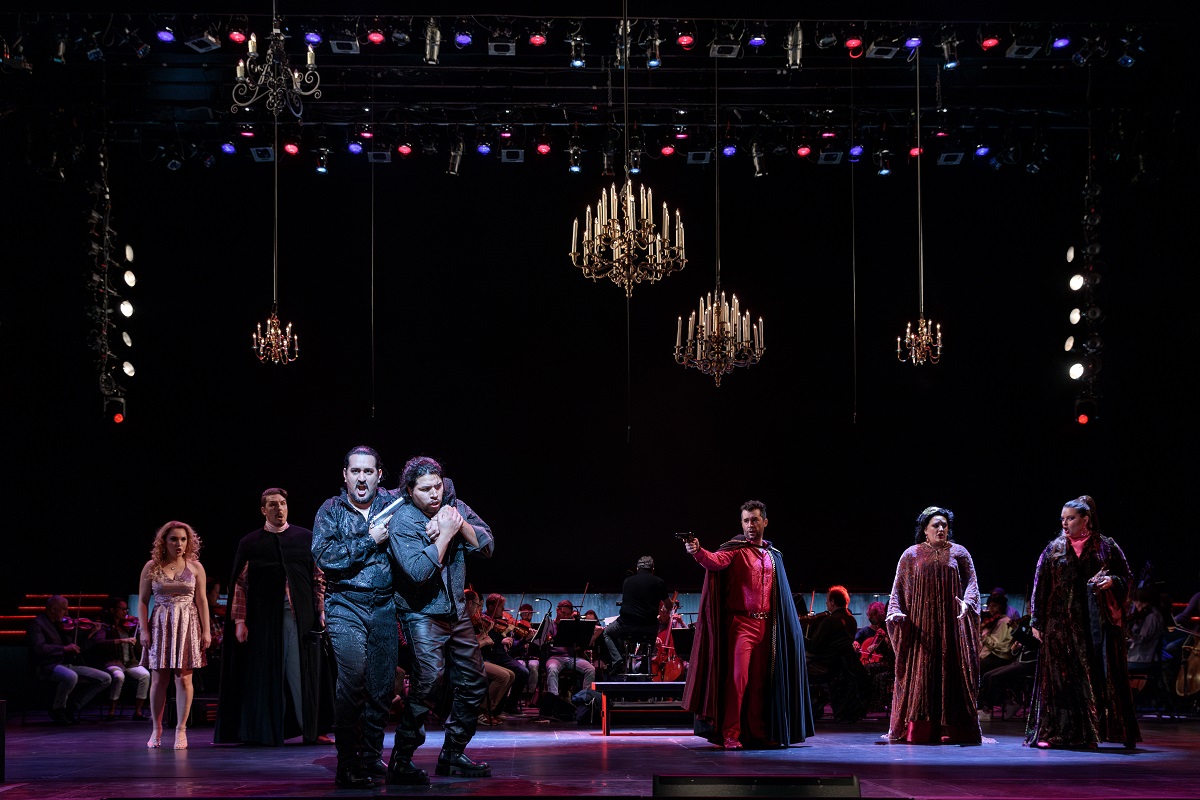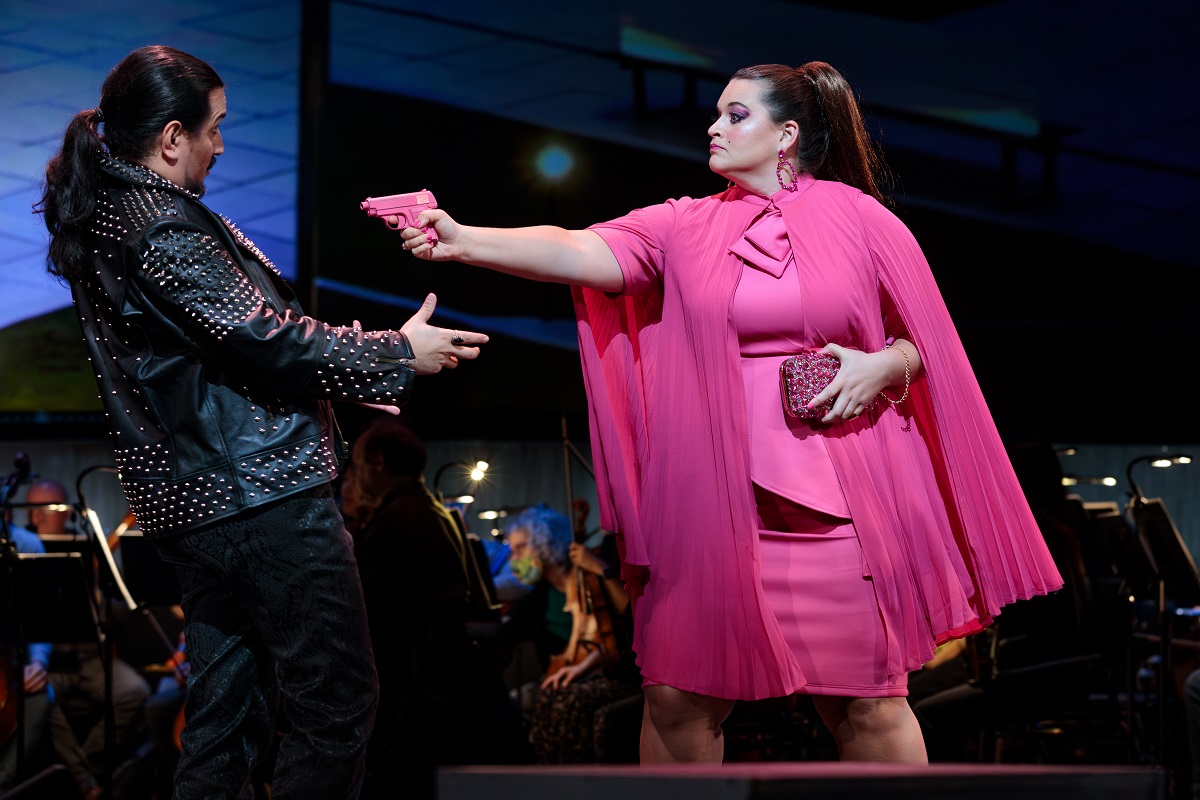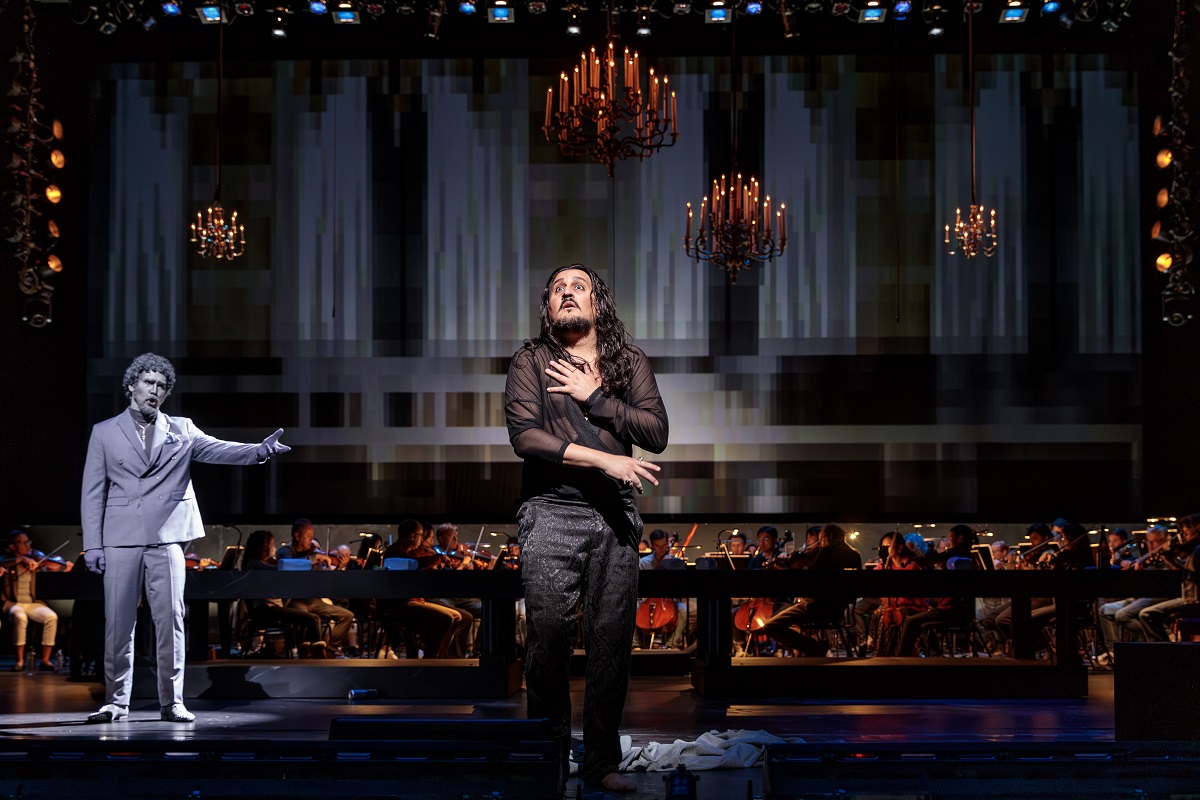Don Giovanni
By Wolfgang Amadeus Mozart
San Diego Civic Theatre
1100 Third Avenue
San Diego, CA 92101
Friday, February 2, 2024 at 7:30 pm
Sunday, February 4, 2024 at 2:00 pm
Season Sponsor
City of San Diego
Production Sponsor
Dr. Leon Lachman
Artist Sponsors
Anne and Andy McCammon for Ethan Vincent
Janet and Jonathan White for Tasha Koontz
KNOW BEFORE YOU GO – click here to plan your experience.
Considered to be a perfect opera, this tale of seduction and revenge features stunning visuals and the orchestra onstage heightening Mozart’s glorious music.
We showcase Mozart’s incredible score by placing the San Diego Symphony Orchestra front and center.
Surrounded by fully staged and costumed singers and state-of-the-art theater lighting and projections, this new production provides a complete and stunning visual and auditory experience.
San Diego Opera’s Principal Conductor Yves Abel returns to lead the action, which features the exciting house debut of baritone Germán Enrique Alcántara in the title role.
LANGUAGE – Sung in Italian with English and Spanish text projected above the stage
RUN TIME – 3 hours and 10 minutes, including one intermission
Pre-Opera Talk
The pre-opera talk begins at 6:40 pm before the 7:30 pm Friday evening performance. The Sunday matinee pre-opera talk begins at 1:10 pm before the 2:00 pm curtain.
Mainstage Post-Opera Talk-Back
Stay after the Sunday matinee performance for a Talk-Back. Once the curtain falls, there will be a 10-minute break, then join us in the front of the Dress Circle section where you can ask questions of the stars and cast (subject to availability), and find out what really happened onstage and backstage during the performance!
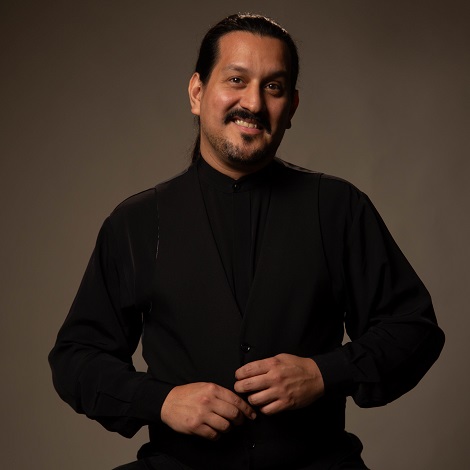
Germán Enrique Alcántara
Don Giovanni

Germán Enrique Alcántara
Don Giovanni
San Diego Opera debut. Argentinean baritone Germán Enrique Alcántara is a graduated of Jette Parker Young Artist Programme of Royal Opera House London, where he had his company debut in the 2018/19 Season as Dancaïre in Carmen. In the same Season he appeared in many other roles at Covent Garden: Baron Douphol in La traviata, Wagner in Faust, Dumas in Andrea Chénier and Moralès in Carmen. In the 2019/20 Season he toured in Japan with ROH (Wagner in Faust) and joined the Christmas Concerts to sing excerpts of La bohème as Marcello. He has been awarded in many international singing competitions, including 1st Prize as baritone at “Jose Carreras Grand Prix” 2021 of the Elena Obraztsova Foundation in Moscow, 3rd Prize along with Audience Prize, “Amics de l’Òpera de Sabadell” Prize and “Concert at Teatro Real” Prize at “Tenor Viñas” 2021 Competition in Barcelona, Golden Medal with high distinction at the 5th Manhatan International Competition in 2020, Laureate at “Queen Elizabeth” Competition 2018 in Belgium, First Prize at Concurso Bach Joven in Paraguay, Second Prize in the Concurso para Jóvenes Estudiantes de Canto Lirico in Buenos Aires, First Prize in the Concours Lyrique International ad Alta Voce in Paris. Recent performances include La bohème (Marcello) at Welsh National Opera Cardiff; The Elixir of Love (Belcore) and The Pearl Fishers (Zurga) at Teatro Colón Buenos Aires; Donizetti’s Caterina Cornaro (Lusignano) at Festival Klangvokal Dortmund; The Marriage of Figaro (Conte di Almaviva) at ROH Covent Garden London at Stadttheater Klagenfurt; Rigoletto at ROH; concert for the winners of “Tenor Viñas” Competition at Teatro Real Madrid.
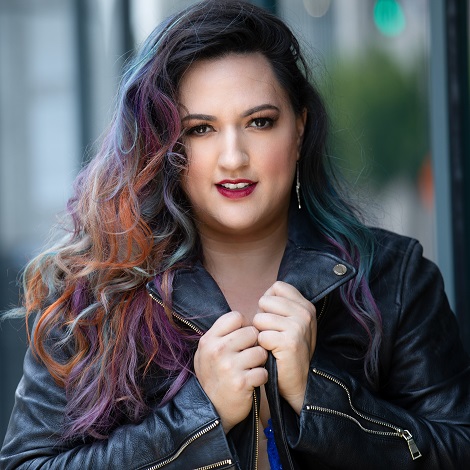
Tasha Koontz
Donna Anna

Tasha Koontz
Donna Anna
Tasha is a Native Hawaiian who has lent her “accurate, powerful voice” (Broadway World) to a gallery of leading operatic ladies and has been recognized by Parterre Box for her “sumptuous, gleaming lyric instrument” and by Opera Wire for her “secure silvery high notes.” In 2024, Tasha will make her South America debut singing the title role in Tosca with Opera Nacional de Chile. Tasha debuted with San Diego Opera in 2017 as Annina in La Traviata, and since then has appeared as Nella in Gianni Schicchi, Suor Genovieffa in Suor Angelica, Frasquita in Carmen, High Pristess in Aida, and Frida 1 in El Ultimo Sueño de Frida y Diego. Recent engagements include appearances with the San Diego Symphony, Chicago Symphony Orchestra, Helena Symphony Orchestra, La Jolla Symphony, and Glacier Symphony Orchestra among others.
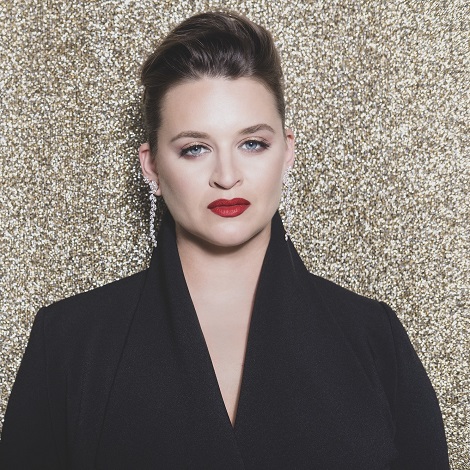
Megan Moore
Donna Elvira

Megan Moore
Donna Elvira
Lyric coloratura mezzo-soprano Megan Moore made her Company debut as La Zelatrice / La Ciesca in 2023’s Puccini Duo of Suor Angelica and Gianni Schicchi. She will make her Seattle Opera debut as Rosina in Il Barbiere di Siviglia. Previously she has been engaged by the Metropolitan Opera, Seattle Symphony, Opera Philadelphia, The English Concert, Santa Fe Opera, Les Musiciens du Louvre, Opera Theatre of Saint Louis, Charleston Symphony, The Orchestra Now, and more, with conductors Bertrand de Billy, Harry Bicket, Corrado Rovaris, Marc Minkowski, Ramón Tebar, Yves Abel, Tan Dun, Nicholas Carter, and Gary Wedow. Her performances have taken her from Carnegie Hall’s Zankel Hall to Emirates Palace in Abu Dhabi. Ms. Moore is co-founder of Lynx Project, which amplifies diverse voices through new song commissions, inclusive concerts, and educational programming. A native of Cincinnati, Ohio, Ms. Moore received her training at Miami University, Eastman School of Music, Internationale Meistersinger Akademie, and The Juilliard School.
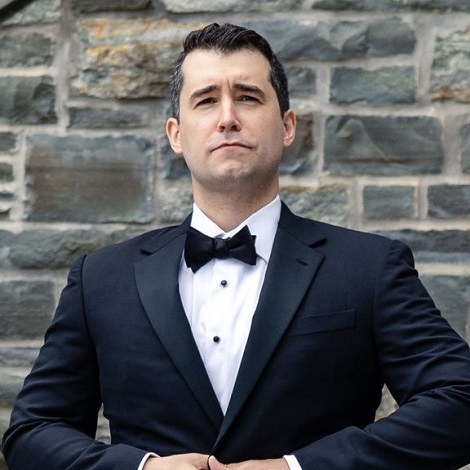
Alex McKissick
Don Ottavio

Alex McKissick
Don Ottavio
San Diego Opera debut. Tenor Alex McKissick has sung on stages from Alice Tully Hall to The Kennedy Center. This season he debuts with Irish National Opera as Narraboth in Salome and sings in the world-premiere of Damien Geter’s American Apollo with Des Moines Metro Opera. He has performed with Aspen Music Festival, Cleveland Orchestra, North Carolina Opera, Richmond Symphony Orchestra, Des Moines Metro Opera, Charleston Symphony Orchestra, Wolf Trap Opera, Washington National Opera, Georg Solti Accademia, working with conductors Franz Welser-Möst, Eun Sun Kim, Daniele Callegari, Keri-Lynn Wilson, and Steven Mercurio. Mr. McKissick regularly performs music of Puts, Verdi, Ullmann, Mozart, and more. His recording of Bernstein’s Songfest was under consideration for a Grammy Award nomination. He has toured with acclaimed trumpeter Chris Botti. Mr. McKissick received his training from Juilliard School of Music and is an alumnus of the Cafritz Young Artist Program at the Washington National Opera.
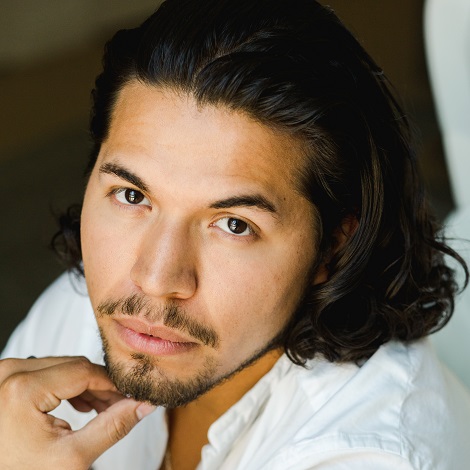
Ethan Vincent
Leporello

Ethan Vincent
Leporello
San Diego Opera debut. American baritone Ethan Vincent launches his 2023-24 season joining the roster of the Metropolitan Opera covering the role of Riolobo in Catán’s Florencia en el Amazonas with Yannick Nézet-Séguin on the podium. He is known for performing Puccini, Berlioz, Beethoven, Donizetti, Verdi, and Tchaikovsky, with the LA Phil, Philadelphia Orchestra, San Francisco Opera, Boston Youth Symphony, Lyric Opera of Chicago, Berkshire Opera Festival, Opera Philadelphia, Cincinnati Opera, Milwaukee Symphony, The Orchestra Now, and more, conducted by Gustavo Dudamel, Eun Sun Kim, Jordan de Souza, Nicholas Carter, Federico Cortese, Lina Gonzalez-Granados, Roberto Kalb, Leon Botstein, and composer John Adams. Mr. Vincent can be seen in the featured role of César in the acclaimed film Bel Canto alongside Academy Award winner Julianne Moore. Mr. Vincent holds both a B.A. and M.A. in Voice Performance from Northwestern University.
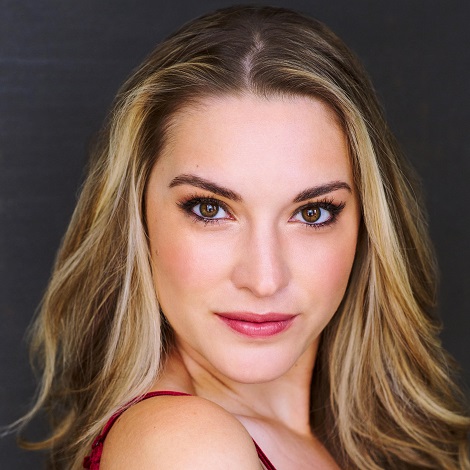
Ashley Fabian
Zerlina

Ashley Fabian
Zerlina
San Diego Opera debut. Acclaimed by the New York Classical Review as “a vision of sunshine and joy”, Ashley Fabian is quickly garnering recognition for her artistry in both comedic and dramatic roles.
2023/24 includes a return to the Los Angeles Philharmonic at the Hollywood Bowl, Gilda in Rigoletto with HALO, Händel’s Messiah with the Winston-Salem Symphony, Chan Parker in Charlie Parker’s Yardbird with Indianapolis Opera, and several performances as the Soprano Soloist in Carmina Burana in the spring with orchestras including the Indianapolis Symphony and Bozeman Symphony.
She has worked with companies including Los Angeles Opera, Seattle Opera, Pittsburgh Opera, Cincinnati Opera, Des Moines Metro Opera, Cincinnati Symphony Orchestra, and Utah Symphony, among others. She enjoys a variety of projects, and has won multiple game shows including Wheel of Fortune.

Stefan Egerstrom
Masetto

Stefan Egerstrom
Masetto
San Diego Opera debut. Bass Stefan Egerstrom joins the roster at the Lyric Opera of Chicago for the 2023-24 season under the baton of music director Enrique Mazzola to cover the roles of Daland in Der fliegende Holländer with director Christopher Alden and Ramfis in Aida with director Francesca Zambello. He will also travel to Tourtour to take part in concerts with The Fondation des Treilles Voice Academy. Last season, Mr. Egerstrom made his debut at the Metropolitan Opera as Fourth Noble in the new François Girard production of Lohengrin conducted by Yannick Neìzet-Seìguin; performed the role of Peneios in Daphne with the American Symphony Orchestra under the baton of Leon Botstein at Carnegie Hall; and returned to the San Francisco Opera to sing Geisterbote in the David Hockney production of Die Frau ohne Schatten with Sir Donald Runnicles on the podium. In the past, he has performed Bach’s Johannes-Passion in addition to a number of new operas including Ricky Ian Gordon’s Morning Star, Gregory Spears’s Fellow Travelers, Kevin Puts’s Silent Night, and Paul Moravec’s The Shining. A native of Minnesota, Mr. Egerstrom received his training at Lawrence University and University of Cincinnati College-Conservatory of Music. He is a former Adler Fellow and Merola Opera Program participant at the San Francisco Opera where he has performed multiple times with Music Director Eun Sun Kim.
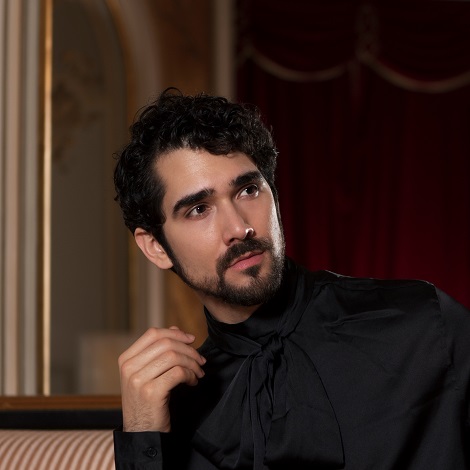
Brent Michael Smith
Commendatore

Brent Michael Smith
Commendatore
San Diego Opera debut. Acclaimed by Opera News as a “standout…with a breathtakingly lush voice,” Brent joined the Ensemble at Opernhaus Zürich in 2021, and has since made multiple role debuts, with more coming. Brent begins his 2023/24 season by singing his fully-staged debut of Masetto in Don Giovanni
at Opernhaus Zürich followed by Il Commendatore at San Diego Opera. He debuts with the Lubbock Symphony Orchestra as Raphael/Adam in The Creation by Haydn as well as debuts with the Phoenix Symphony in The Messiah. A major highlight this season is his professional debut as Fafner in Das Rheingold at Opernhaus Zürich, with Gianandrea Noseda conducting. Closing 2023/24, Brent sings Il Comte Vaudemont in a new production of I vespri siciliani, in addition to Pietro Fléville in a semi-staged version of Andrea Chénier.

Yves Abel
Conductor

Yves Abel
Conductor
Maestro Yves Abel is San Diego Opera’s Principal Conductor. He made his Company debut in 2013 for performances of The Daughter of the Regiment. He returned in 2014 for Pagliacci, in 2016 for Madama Butterfly, in 2019 for Carmen, in 2022 for Roméo et Juliette, and last season conducted the Puccini Duo of Suor Angelica and Gianni Schicchi.
Yves Abel is one of the world’s most versatile conductors, equally comfortable in opera and concert.
Recently extended as San Diego Opera’s Principal Conductor till July 2027, he returns for Don Giovanni and Madama Butterfly this year (2024).
His previous posts include Chief Conductor of Germany’s Nordwestdeutsche Philharmonie from 2005-2021, and Principal Guest Conductor of the Deutsche Oper Berlin from 2005-2013.
A frequent guests of the world’s great opera houses, Yves is regularly invited to the Metropolitan Opera, the Vienna Staatsoper, La Scala, London’s Royal Opera, Munich and Hamburg Staatsopers, the Paris Opera, the San Francisco Opera, and Barcelona’s Liceo, and many others.
His recordings include operas and recital discs with some of the world’s finest artists, including Renee Fleming, Thomas Hampsin, Elina Garança, Andrea Bocelli, to name a few.
In the near future, he makes important debuts at the Royal Opera in Stockholm and the Zurich Opera and returns to the Vienna Staatsoper, the Rossini Festival in Pesaro and the Canadian Opera Company among others.
In 2009, he was awarded the title of Chevalier de l’Ordre des Arts et des Lettres by the French government.
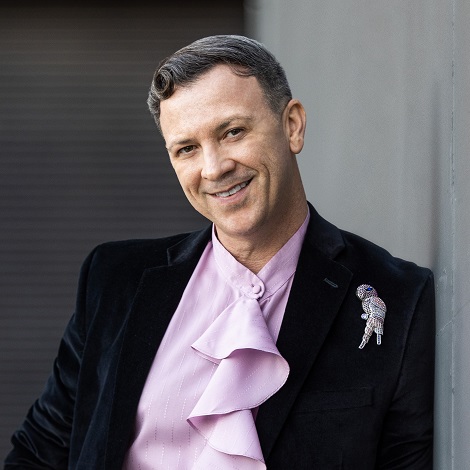
Kyle Lang
Stage Director

Kyle Lang
Stage Director
Kyle Lang is a director and choreographer newly relocated from Maui, Hi to San Diego. His more recent directing credits include Turandot with Teatro Petruzzelli di Bari, The Puccini Duo, Carmen, and As One with San Diego Opera, Becoming Santa Clause with Chicago Opera Theater, Die Zauberflöte with The Dallas Opera, Le Nozze di Figaro, The Pirates of Penzance and La Cenerentola with Virginia Opera, Die Fledermaus with Utah Opera, and The Bear with Wexford Festival Opera. His recent choreographic credits include Becoming Santa Clause with Chicago Opera Theater, The Pirates of Penzance with Virginia Opera and Utah Opera, My Fair Lady with Teatro Massimo di Palermo and Teatro San Carlo di Napoli, Ariadne auf Naxos with Santa Fe Opera, Vanessa with Wexford Festival Opera, and Turandot with Virginia Opera. Upcoming projects include La Bohéme with Hawaii Opera Theatre, The Pirates of Penzance with Central City Opera, and Carmen with Virginia Opera.
Synopsis in English
ACT I
Late at night, Don Giovanni’s servant Leporello is keeping watch when his master, Don Giovanni, rushes out of a house pursued by Donna Anna. Her father, the Commendatore, rushes out to defend her ensuing a duel with Giovanni who slays the old man and flees. Anna returns with Don Ottavio, her fiancé, and the two swear revenge. In the early morning, Giovanni’s jilted lover Donna Elvira searches for him. Servant and master spy on her and when they all meet, Giovanni talks his way out of trouble and escapes, leaving Leporello to explain his master’s philandering ways.
Later, Giovanni and Leporello hap¬pen upon the nuptial celebration of Masetto and Zerlina. The latter excites Giovanni’s fancy, but his seduction of her is interrupted by Elvira, who sweeps Zerlina away. Anna and Ottavio arrive, not yet recognizing Giovanni as the murderer. When Elvira interrupts again, Giovanni attempts to pass off her hysterics as madness and leaves to “help” Elvira in her distress. Anna soon realizes the truth and calls for vengeance. Not in the least deterred, Gio¬vanni orders Leporello to prepare a lavish party for all the neighbors. He renews his wooing of Zerlina, but her sharp-eyed fiancé intervenes.
As Giovanni leads the young couple into the villa, Anna, Ottavio, and Elvira enter wearing masks and are quickly invited by the master to join the festivities. With the party in full swing, Giovanni leads Zerlina into an adjoining room. Her cries, however, bring everyone to her aid. Giovanni tries to make Leporello seem like the offending villain, but no one is taken in. The three guests unmask and Don Gio¬vanni’s adventures seem at an end, but by a sudden intervention, he once again escapes his accusers.
ACT II
Later that evening Don Giovanni soothes a disgruntled Lep¬orello and hatches his latest plot, this one aimed at Elvira’s maid and requiring master and servant to exchange clothes. Elvira is lured away by the man she thinks is her beloved, and the real Giovanni is left to serenade the maid. Just then an armed Masetto and his followers arrive in search of the fugitive. The supposed Lep¬orello sends them off in all directions, disarms Masetto, and beats him. Leporello, still disguised as Don Giovanni, is trying to escape when Anna, Ottavio, Masetto, and Zerlina converge upon him. Leporello reveals his identity, confusing everyone, and escapes.
Later that night, Giovanni and Leporello have sought refuge in a cemetery. Their conversation is interrupted by a ghostly voice from the statue over the Commendatore’s grave. In response to a doomful warning, Giovanni orders Leporello to invite the statue to his villa for a pre-dawn supper. The invitation is accepted, and the two return to the villa to prepare. Ottavio seeks to console Anna, suggesting marriage. Temporarily rejected, he charges Anna with cruelty. Anna protests her love and begs for patience. Giovanni eats supper while a wind band serenades him with popular tunes of the day.
Elvira rushes in resolved to forgive Giovanni and tries to persuade him to change his ways. He cruelly taunts her, and she leaves in despair. Moments later, her terrified scream is heard and Leporello rushes to see what is wrong. He returns in terror, announcing the arrival of the statue of the Commendatore. In deadly jest, the Commendatore asks if Giovanni will dine with him, and the arrogant Giovanni accepts. The Commendatore demands repeatedly that Giovanni repent his sins, but he is refused. Finally, Don Giovanni meets his death.
Sinopsis en Español
PRIMER ACTO
Entrada la noche, Leporello, el sirviente de Don Giovanni está vigilando cuando su amo, Don Giovanni, sale corriendo de una casa perseguido por Donna Anna. Su padre, el Comendador, sale corriendo para defenderla y se desata un duelo entre Giovanni y el anciano, a quien Giovanni mata y luego huye. Anna regresa con Don Ottavio, su prometido, y los dos juran venganza. En la madrugada, Donna Elvira, la amante abandonada de Giovanni, lo busca. El sirviente y el amo la espían y cuando todos se encuentran, Giovanni se las arregla para salir del problema y escapa dejando a Leporello para explicar las andanzas de su amo.
Después, Giovanni y Leporello se encuentran con la celebración nupcial de Masetto y Zerlina. Esta última atrae la atención de Giovanni, pero su seducción es interrumpida por Elvira, quien se lleva a Zerlina. Anna y Ottavio llegan sin reconocer aún a Giovanni como el asesino. Cuando Elvira interrumpe nuevamente, Giovanni intenta hacer pasar sus histerias como locura y se va a “ayudar” a Elvira en su angustia. Anna pronto se da cuenta de la verdad y clama por venganza. Sin embargo, Giovanni ordena a Leporello que prepare una fiesta fastuosa para todos los vecinos. Vuelve con su cortejo a Zerlina, pero su astuto prometido interviene.
Al momento que Giovanni guía a la joven pareja hacia la villa, Anna, Ottavio y Elvira entran con máscaras y son invitados rápidamente por el amo a unirse a la fiesta. Con la fiesta en pleno apogeo, Giovanni lleva a Zerlina a una habitación contigua. Sin embargo, sus gritos llaman la atención de todos, quienes acuden a su ayuda. Giovanni intenta hacer pasar a Leporello como el villano ofensor, pero nadie se deja engañar. Los tres invitados se quitan las máscaras y parece que las aventuras de Don Giovanni han llegado a su fin, pero mediante una intervención repentina, una vez más, escapa de sus acusadores.
SEGUNDO ACTO
Más tarde, Don Giovanni tranquiliza a un disgustado Leporello y trama su último plan, esta vez dirigido a la criada de Elvira y requiriendo que amo y sirviente intercambien ropas. Elvira es atraída por el hombre que cree que es su amado, y el verdadero Giovanni se queda para serenatear a la criada. En ese momento, un armado Masetto y sus seguidores llegan en busca del fugitivo. El supuesto Leporello los manda en distintas direcciones, desarma a Masetto y lo golpea. Leporello, aún disfrazado como Don Giovanni, intenta escapar cuando Anna, Ottavio, Masetto y Zerlina lo rodean. Leporello revela su identidad, confundiendo a todos, y escapa.
Más tarde esa noche, Giovanni y Leporello se han refugiado en un cementerio. Su conversación es interrumpida por una voz fantasmal proveniente de la estatua sobre la tumba del Comendador. En respuesta a una advertencia funesta, Giovanni ordena a Leporello invitar a la estatua a su villa para una cena antes del amanecer. La invitación es aceptada y regresan a la villa para prepararse. Ottavio busca consolar a Anna, sugiriendo matrimonio. Temporalmente rechazado, acusa a Anna de crueldad. Anna protesta su amor y ruega por paciencia. Giovanni cena mientras una banda de viento lo serenatea con melodías populares de la época.
Elvira irrumpe resuelta a perdonar a Giovanni e intenta persuadirlo de que cambie sus formas. Él la provoca cruelmente y ella se va desesperada. Momentos después, se escucha su grito aterrorizado y Leporello corre a ver qué sucede. Regresa espantado anunciando la llegada de la estatua del Comendador. En una broma mortal, el Comendador pregunta si Giovanni cenará con él, y el arrogante Giovanni acepta. El Comendador exige repetidamente que Giovanni se arrepienta de sus pecados, pero él se niega. Finalmente, Don Giovanni encuentra su muerte.
Corporate Sponsors














